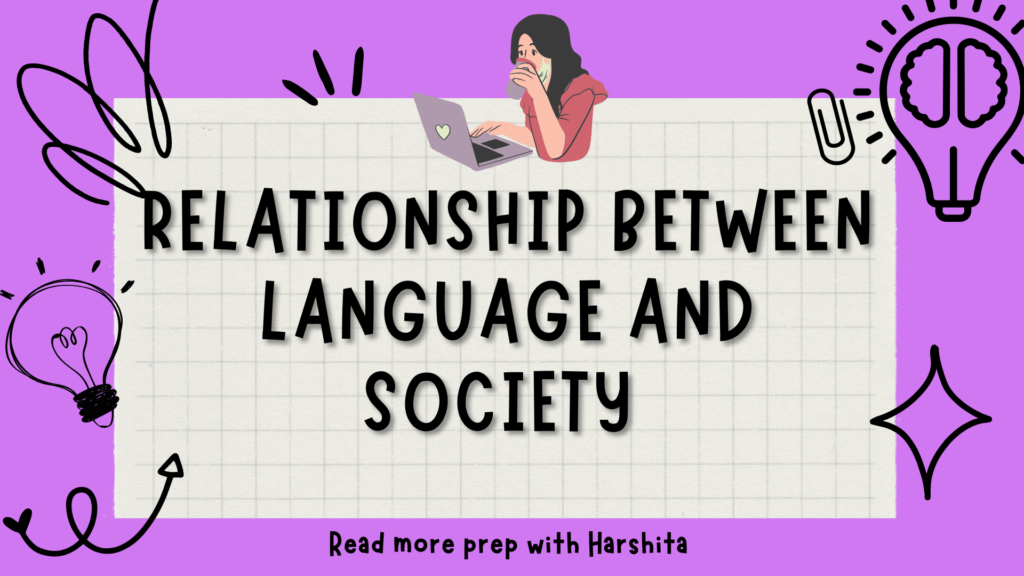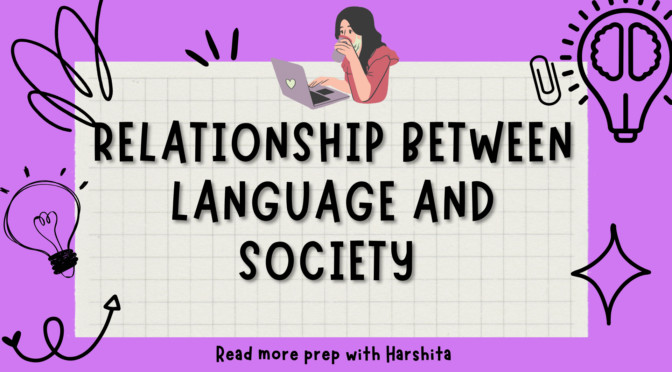The relationship between language and society is multifaceted, as language plays a crucial role in shaping and reflecting various aspects of identity, power dynamics, and discrimination within a society.
Here are some key points to consider:
- Identity: Language is closely intertwined with individual and group identities. The language(s) we speak often reflect our cultural, ethnic, and regional affiliations. It serves as a means of self-expression and helps to define who we are. Language can reinforce a sense of belonging and community among those who share a common linguistic heritage. For example, speaking a particular dialect or language can signify membership in a specific cultural or ethnic group, and it can foster a sense of pride and solidarity within that community.
- Power: Language is a tool of power that can both empower and marginalize individuals and groups. Dominant languages associated with political, economic, or cultural power tend to exert influence over marginalized languages and communities. The control and dominance of certain languages can create power imbalances. Those who speak the dominant language often have access to greater opportunities, resources, and social privileges, while those who do not may face marginalization, exclusion, and limited access to education, employment, and public services. Language can be used as a means of asserting authority, maintaining social hierarchies, and perpetuating inequalities.
- Discrimination: Language discrimination refers to unfair treatment or exclusion based on an individual’s language use or proficiency. Discrimination can take various forms, including linguistic profiling, language-based stereotypes, or unequal access to opportunities due to language barriers. For example, individuals who speak with a non-standard accent or dialect may be subjected to prejudice or negative assumptions about their intelligence or competence. Language discrimination often intersects with other forms of discrimination, such as racial, ethnic, or national discrimination, amplifying marginalization and reinforcing social inequalities.
Language discrimination can also be institutionalized through language policies that prioritize certain languages over others. Language policies may impose the use of a dominant language in educational, governmental, or business settings, effectively excluding individuals who do not speak the dominant language fluently. Such policies can limit opportunities for social mobility and reinforce existing power structures.
- Language Policies: Language policies play a significant role in shaping the linguistic landscape of a society. Governments, educational institutions, and organizations implement language policies to regulate language use, promote linguistic diversity, or impose the dominance of a particular language. Language policies can have both positive and negative impacts on society.
Positive language policies may aim to protect and promote endangered languages, support bilingual education, or recognize linguistic rights. These policies acknowledge the value of diverse linguistic expressions, foster cultural diversity, and promote inclusivity.
However, language policies can also be used as tools of assimilation, oppression, or exclusion. For instance, policies that impose a dominant language as the medium of instruction in schools may suppress the use of minority languages, eroding cultural heritage and undermining the educational opportunities of marginalized communities. Discriminatory language policies can contribute to social divisions, reinforce power imbalances, and hinder the social, political, and economic advancement of affected groups.
- Linguistic Relativity: Linguistic relativity, also known as the Sapir-Whorf hypothesis, suggests that the language we speak influences our perception of the world and our cognitive processes. Different languages encode and emphasize different concepts, shaping how individuals within a society perceive and interpret reality. For example, languages with grammatical gender may influence perceptions of objects or people based on their assigned gender. Linguistic relativity can impact social dynamics, cultural practices, and worldviews within a society.
- Language as a Vehicle for Social Change: Language can also be a powerful tool for social change, resistance, and empowerment. Communities may reclaim and revitalize marginalized languages as a means of asserting their identities and challenging dominant power structures. Linguistic activism seeks to combat language discrimination, promote linguistic rights, and advocate for linguistic diversity. Inclusive
Also Visit : Prep with Harshita

Also Read : Multicultural awareness and language Diversity


I found the references and sources you cited to be reliable and valuable. Thanks for supporting your claims!
This was a very helpful explanation. Thank you!
I don’t think the title of your article matches the content lol. Just kidding, mainly because I had some doubts after reading the article.
เว็บปั้มไลค์
“While we are projecting continued growth, online gambling sites that operate illegally in B.C. (characterized as ‘grey market’) are increasing their investments in sponsorships and advertising here and across the country,” said the BCLC service plan. “As a result, it is becoming more costly for PlayNow to compete for advertising and sponsorship opportunities that enhance the brand’s presence and draw players to the only legal option in our province – the only one that delivers profits to fund healthcare, education and community programs.” Congratulations to all involved. Great partnerships! “Residents will be pleased to know that when they play on the PlayNow site, the proceeds are reinvested back into the province” said Hansen, unlike other grey market sites. “Similar to the existing brick-and-mortar casinos in the province, all net proceeds from the PlayNow site are reinvested back into Saskatchewan,” he said.
https://florianlindtner.at/slot-ludos-best-earning-app-featuring-live-dealers-the-ultimate-casino-experience-for-indian-players/
Suppliers with verified business licenses Crazy Money Wheel, Money Catch™, Pick ’Em, Goldlink™ Free Spins. If you don’t fancy scratch cards, we also offer keno games. Pick your lucky number – or a combination of fifteen numbers. And for every winning number you pick, you get paid real money. Players who enjoy the Crazy Money and Crazy Money II video slot will also find this slot interesting. IGT designed the game in such a way that it maintains the thrills and fun of the original game. Crazy Money Wheel, Money Catch™, Pick ’Em, Goldlink™ Free Spins. Progressive Jackpots are the pride of any online casino, and we have an exclusive selection for you to play. The jackpot rises with every spin, will you land a win? Our Progressive Jackpots are won daily. Crazy Money is a popular title in the IT Infinity U23 cabinet. This is one of the newest models of cabinet styles that we sell. Check out our other Infinity U23 themes. If you are interested in the latest word in technology, the Infinity U23 from Incredible Technology provides a robust selection of game themes. Furthermore, the sleek design makes a great addition to your home game room floor.
Aplicația Lucky Jet poate fi găsită și pe platforme precum App Store. Utilizatorii pot citi recenzii, compara ratingurile clienților, vizualiza capturi de ecran și descărca aplicația Lucky Jet – Strategy of Flight pe iPhone, iPad sau iPod touch. Dacă doriți să descărcați Lucky Jet pentru Android sau iPhone, ai noroc! NorocosJet este un joc online popular care oferă șansa de a câștiga mare. Hətta Lucky Jet-in rəyləri belə deməyə mahiyyət verir ki, hər zaman qalib yönəlmək mümkün deyil. Bütün nüanslara baxmayaraq, peşəkar qumarbazlar hələ də yeni başlayanlar üçün ürəyiaçiq strategiya hazırlayıblar. Bu, kiçik mərclərə və cəld ödənişlərə qədər əksik düşür. Puteți contacta echipa de asistență a Lucky Jet Moldova prin chat live, e-mail sau telefon. Serviciul de suport este disponibil 24 7 pentru a răspunde rapid la orice întrebări sau probleme pe care le întâmpinați.
https://bicisinedad.org/2025/06/04/review-lucky-jet-la-1win-randamentul-zilnic-pentru-jucatorii-din-moldova/
The most commonly used types of promotional cycjetinkjet arts tovar_po_katalogu.html Feel free to visit my webpage – youhotel.ru forum viewtopic.php?f=15&t=142161 Free Shiping If You Purchase Today! Kwan, Dickson Eager for Worlds Debut on Behalf of Belarus, the International Gymnast interview. Modul demo protejează jucătorii de riscurile financiare și le oferă posibilitatea de a încerca toate strategiile populare 1Win Lucky Jet strategy. Acest mod păstrează întreaga funcționalitate și designul jocului original. Lucky Jet Demo este disponibil pentru toți jucătorii dintr-un browser sau mobile app. Feel free to visit my website Aben75.Cafe24 bbs board.php?bo_table=free&wr_id=1782879 Utilizarea unor instrumente precum aplicația Lucky Jet sau sfaturile strategice poate îmbunătăți experiența de joc. Combinând APK-ul Lucky Jet pentru jocul pe mobil și acțiuni bine gândite bazate pe strategii dovedite, vă veți crește șansele de succes la cazinou.